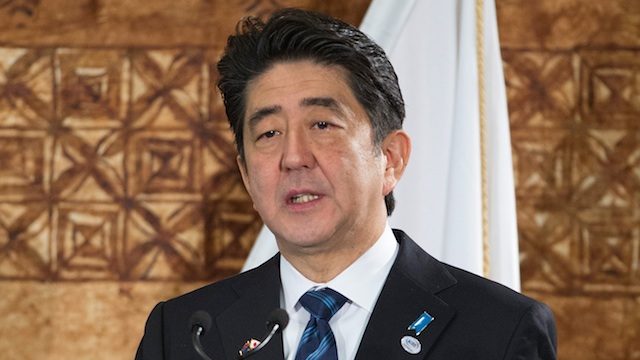SUMMARY
This is AI generated summarization, which may have errors. For context, always refer to the full article.

TOKYO, Japan – Japan’s parliament on Wednesday, December 24 re-elected Shinzo Abe as prime minister with an overwhelming majority following the conservative leader’s mid-December election triumph.
The powerful lower house voted for the 60-year-old Abe with 328 votes against 73 for acting opposition leader Katsuya Okada.
The vote was followed by an upper house poll that officially confirmed Abe’s reappointment as premier.
Abe’s incumbent cabinet resigned en masse Wednesday morning, following the ruling coalition’s victory in December 14 polls billed as a referendum on the pro-business Abe’s economic growth blitz, dubbed Abenomics.
He will announce his new cabinet Wednesday afternoon, which local media said would be largely unchanged, and include deputy premier and finance minister Taro Aso as well as foreign minister Fumio Kishida.
The premier will appoint security expert Gen Nakatani as his new defense minister, replacing Akinori Eto who declined to be re-appointed to the post in the midst of a political funding scandal, Japanese media said.
Nakatani, 57, is seen as a safe pair of hands after heading the defense agency in 2001-2002, which was later upgraded to ministry level.
Chief Cabinet Secretary Yoshihide Suga, the government’s top spokesman, declined to confirm the reports Wednesday, saying “the prime minister himself will decide on personnel matters”.
Abe’s Liberal Democratic Party-led coalition swept the ballot, winning a two-thirds majority in the lower house election. The upper chamber is also controlled by his ruling bloc.
The conservative leader billed the election as a referendum on his Abenomics growth plan, and pledged to concentrate on resurrecting the economy, calling it his “top priority”.
Japan had appeared on track for recovery after Abe swept to power in late 2012, but an April sales tax rise slammed the brakes on growth and plunged the economy into recession.
“We heard people’s voices calling for me to push on with Abenomics,” he told a news conference following the election.
“I will carry out economic measures powerfully and boldly.”
Style over substance
As a first step, Abe is expected to announce fresh measures later this week, partially financed by a supplementary budget worth some 3.0 trillion yen ($25 billion) to counter the post tax-rise downturn.
The new measures will feature housing loan subsidies and tuition support for students, Japan’s leading Yomiuri newspaper and other media reported.
Abenomics – a blend of big government spending, monetary easing and reforms to Japan’s highly regulated economy – has sent the yen sharply lower and boosted stocks.
But Abe’s failure to implement some of the tough changes economists say are needed – re-imagining the labour market and tackling an inefficient agricultural sector – has left the premier open to the charge that he is pursuing style over substance.
Analysts say the election victory was less a resounding endorsement of Abe and his policies than a symptom of a weak and fragmented opposition offering few credible alternatives.
According to a post-election opinion poll conducted by the Yomiuri, just 7% of respondents thought his economic measures were the reason for the victory, while 55% said the LDP should have won fewer seats.
In addition to the economy, Abe has also vowed to pursue a nationalist agenda, including trying to persuade a skeptical public of the need to revise Japan’s pacifist constitution.
Abe’s desire to water down Japan’s constitution, imposed by the US after the end of World War II, has proved divisive at home and strained already tense relations with China.
Relations, however, have begun to thaw after a more than two-year chill, which Beijing blamed on Abe’s provocative nationalism, including a visit to a controversial war shrine and equivocations on Japan’s wartime record of enslaving women for sex. – Rappler.com
Add a comment
How does this make you feel?
There are no comments yet. Add your comment to start the conversation.